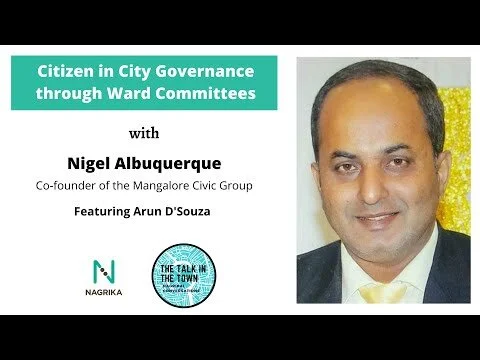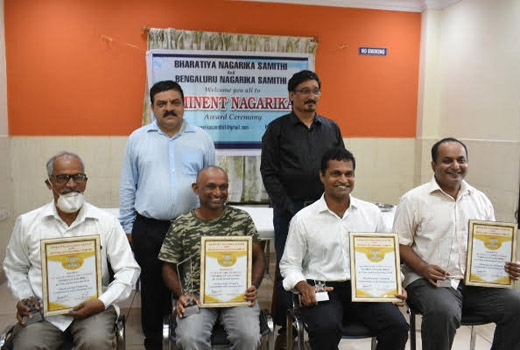Civic movement is very effective at cities like Mangalore. It is because of the dedication and transparency maintained by Citizen Leaders like Nigel Albuquerque. Mangalore is a city known for its vibrant culture and history. Civic responsibility and community participation had helped the city development.
As the convenor of the Mangalore Civic Group, Nigel has been instrumental in driving positive change across the city. His work, focused on enhancing civic engagement, transparency, and accountability in governance, has earned him widespread recognition.

Paul: Nigel, thank you for taking the time to speak with Global TV today. Can you start by telling us a bit about the Mangalore Civic Group and your role as its convenor?
Nigel Albuquerque: Thank you for having me. The Mangalore Civic Group was established with the primary goal of empowering citizens to actively participate in the governance of our city. As the convenor, my role involves coordinating our various initiatives, which range from advocating for better urban infrastructure to ensuring transparency in local governance. We believe that a well-informed and engaged citizenry is essential for the healthy functioning of any democracy.

Paul: Your group has been quite active in advocating for citizen-friendly infrastructure and urban planning. Could you elaborate on some of the key initiatives in this area?
Nigel Albuquerque: Absolutely. One of our main focus areas has been to ensure that urban planning projects in Mangalore are designed with the community’s needs at the forefront. For instance, we’ve been pushing for better public transportation systems, safer pedestrian pathways, and the creation of more green spaces. Our goal is to make Mangalore a city that is not only functional but also livable for all its residents.
Paul: Transparency and accountability in governance are also central to your work. What specific actions has the Mangalore Civic Group taken to promote these values?
Nigel Albuquerque: We’ve been quite proactive in this regard. We regularly organize public forums where citizens can directly engage with local government officials. These forums provide a platform for discussing issues ranging from budget allocations to the implementation of municipal projects. Additionally, we’ve been advocating for the digitization of government records and the regular publication of council meeting minutes to make governance more transparent and accessible to the public.
Paul: Another area where your group has made a significant impact is in raising public awareness on social and environmental issues. Can you share some examples of the campaigns you’ve led?
Nigel Albuquerque: One campaign that stands out is our initiative on waste management. We’ve conducted numerous workshops across the city to educate residents on waste segregation and the importance of reducing single-use plastics. We also ran a citywide tree-planting drive, which saw the participation of thousands of citizens. These campaigns are aimed at fostering a sense of responsibility towards our environment and encouraging sustainable practices.
Paul: Your advocacy for the Ward Committee system has been particularly noteworthy. What inspired you to champion this cause, and what impact has it had on local governance?
Nigel Albuquerque: The Ward Committee system is something I’m very passionate about. It’s designed to decentralize power and bring decision-making closer to the people. Each ward in the city has its unique challenges and needs, and this system allows citizens to have a direct say in how their local area is governed. We’ve been conducting workshops to educate residents about how they can participate in these committees, and the response has been overwhelmingly positive. It’s empowering to see people take ownership of their communities and hold their elected representatives accountable.
Paul: It’s clear that your work has had a significant impact on Mangalore. What motivates you to continue this work, despite the challenges?
Nigel Albuquerque: The motivation comes from the community itself. Seeing the positive changes that can happen when people come together and work towards a common goal is incredibly rewarding. There are challenges, of course, but I firmly believe that a just and equitable society is worth fighting for. Every small step we take towards better governance and civic engagement brings us closer to that goal.
Paul: Finally, what are your future plans for the Mangalore Civic Group? Are there any upcoming projects you’re particularly excited about?
Nigel Albuquerque: We’re currently working on a project to create a comprehensive database of civic issues in Mangalore, which will be accessible to the public. This will help citizens report problems more efficiently and allow us to track the local government’s response to these issues. We’re also planning to expand our environmental initiatives, particularly focusing on promoting sustainable energy solutions within the city. There’s a lot of work to be done, but I’m excited about the possibilities.
Paul: Nigel, thank you so much for sharing your insights with us today. Your dedication to improving the civic life of Mangalore is truly inspiring.
Nigel Albuquerque: Thank you. It’s been a pleasure speaking with you, and I hope our conversation encourages more people to get involved in their communities.





